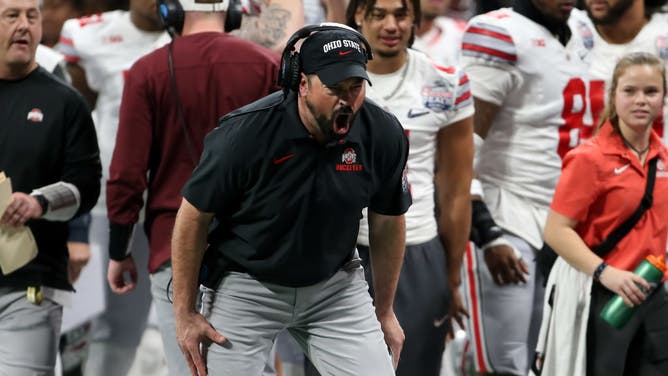How Was Targeting Not Called On Georgia For Hit On Ohio State WR Marvin Harrison Jr.?
ATLANTA - Ohio State clearly needed wide receiver Marvin Harrison Jr. after he left with a concussion late in the third quarter of the Buckeyes' 42-41 loss to No. 1 Georgia in a College Football Playoff semifinal Saturday.
Harrison caught five passes for 106 yards in the first half with a 31-yard touchdown for a 7-0 lead in the first quarter and a 16-yard touchdown reception for a 21-7 lead early in the second period. He was targeted 10 times in all by quarterback C.J. Stroud, but caught no passes in the second half.
OHIO STATE CAME SO CLOSE, IT HURT
Georgia also may have targeted him once. This is when Stroud threw for Harrison in the end zone on third and goal from the 7-yard line with Ohio State up 35-24 in the final minute of the third quarter. The pass fell incomplete, and the Buckeyes settled for a field goal and 38-24 lead.
Did Georgia's Javon Bullard Target Marvin Harrison Jr.
Defensive back Javon Bullard, wearing No. 22 for Georgia, hit Harrison in the head with his helmet and shoulder as the play ended, and it looked like targeting. A flag was thrown on impact, but it was later ruled that targeting had not happened. But Harrison was done for the night with concussion symptoms.
"I was told that it was not targeting," Ohio State coach Ryan Day said. "And that he (Harrison) did not take a shot to the head, which is hard. I didn't see it, so I don't know. But to get a concussion and not get hit in the head - I'd have to see the replay."

Ohio State coach Ryan Day celebrates a 21-7 lead in the second quarter on a 16-yard touchdown catch by WR Marvin Harrison Jr. against Georgia Saturday in the College Football Playoff semifinal in Atlanta. Harrison left in the third quarter with a concussion after a hit to the head, but targeting was not called. (Photo by Michael Wade/Getty Images)
It is not if a player is hit in the head or if he gets a concussion, according to the rule, though. It depends if the defender was using his head. At first glance and in some replays, it looked like targeting. Other replays, though, showed that Bullard was leading more with his shoulder, which is legal. The rule does state, though, that "when in question, it is a foul."
It's at least, in question, but replays appeared to be inconclusive, so the call was overturned.
Stroud clearly was not the same quarterback after Harrison left. And Ohio State was not the same team. Stroud finished 4-of-8 passing for 29 yards with a sack and no touchdowns from the point Harrison exited. Before that, Stroud was 19-of-26 passing for 319 yards and four touchdowns. The Buckeyes managed only two field goals without Harrison.
Ohio State WR Marvin Harrison Jr. Was Missed Late
"To say that losing Marv didn't have an impact on the game," Day said. "It absolutely did."
After Ohio State took over with 54 seconds to play and trailing 42-41, Stroud was just 1-of-3 passing for 12 yards. He got his team within range of a 50-yard field goal with three seconds to play with his legs. Stroud gained 32 yards on two carries with a 27-yard scramble to the Georgia 31-yard line with 24 seconds left.
After a 1-yard gain by running back Dalan Hayden, Stroud threw to wide receiver Xavier Johnson, but cornerback Kelee Ringo broke it up. Ringo struggled to cover Harrison in the first half. Stroud missed on another pass on third down, and Noah Ruggles' 50-yard field goal attempt hooked wide left.
No. 1 Georgia (14-0) advances to play No. 3 TCU (13-1) in the national championship game on Jan. 9 in Inglewood, California (7:30 p.m., ESPN). TCU defeated No. 2 Michigan, 51-45, in the other semifinal Saturday in Glendale, Arizona. No. 4 seed Ohio State finished 11-2.
"The last drive, man, I saw how much time we had with timeouts, and I knew we could do it," Stroud said, but he tried to do it alone.
"I tried my hardest to get us down there," he said. " I've got to maybe split somebody else, make another move, just try to get a little more."